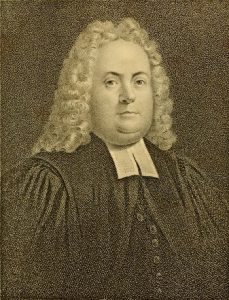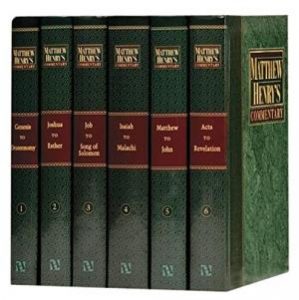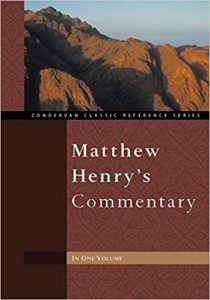Matthew Henry’s Bible commentary is one of the most popular Bible study resources available online today. Each day millions of Christians search for, read, and learn from his commentary on the internet, even though it is centuries old. Yet many people wonder if his commentary is good.
Matthew Henry’s Bible commentary is a very good resource, according to those who use it for personal Bible study and teaching and preaching preparation. People like it because it’s easy to understand and because Henry is very quotable.
Yet many people who use his well-reviewed commentary don’t know anything about Matthew Henry, the man, including what he believed or if his writings are trustworthy. Keep reading to learn more.
After reading this article, please see Best Bible Commentaries: Top 50. Based on aggregate reviews.

Who Was Matthew Henry?
Matthew Henry was born in the United Kingdom in 1662. At just nine years old, thanks to his father, Phillip, a Christian minister, Matthew could write Latin and read parts of the New Testament in Greek.
As he grew, Matthew showed signs of academic gifting. To help Matthew reach his potential, Phillip sacrificed so Matthew could receive a high-quality college education.
| Fast Facts about Matthew Henry |
|---|
| Life: Henry lived from 1662-1714 in England |
| Theology: Henry was Reformed Baptist. In matters of soteriology (or salvation), he was Reformed. In matters of ecclesiology (or the church), he was Baptist. |
| Commentary: Henry’s complete commentary is six volumes. His concise whole-Bible commentary is one volume. Both are considered great commentaries by those committed to using them. |
| Famous quote: “The woman was made of a rib out of the side of Adam; not made out of his head to rule over him, nor out of his feet to be trampled upon by him, but out of his side to be equal with him, under his arm to be protected, and near his heart to be beloved.” (from his Genesis commentary) |
| Free downloads: Find parts of Henry’s commentaries on Best Bible Commentaries’ free Bible commentaries download page. |
| Spurgeon: Charles Spurgeon loved Henry’s commentaries and said every Christian should read through them at least once in their lifetime. |
Phillip sent Matthew to college when his son was 18. Though Matthew initially studied law, he eventually pursued theology and Christian ministry.
Matthew was educated and trained by “non-conformists” clergy, which in 17th-century Europe referred to Protestants who disagreed with the state denomination, The Church of England, also called Anglicanism.
(Note: The Anglican Church of 17th century Europe significantly reflected The Roman Catholic Church of the time period. It later developed unique convictions and practices.) [1]
Matthew began to preach and teach the Bible, and according to those who heard him, he demonstrated an uncommon gift for communication. It wasn’t long before he was a sought-after speaker.
Matthew developed a reputation for explaining the biblical text and helping listeners apply it to their lives. His teaching and preaching style evidently transcended his time period, as evidenced by the fact that many people today enjoy reading his comments on the Bible and his suggestions for application.
Looking for Baptist commentaries? See Best Baptist Commentaries: 100 Volumes to learn more.
What Did Matthew Henry Believe?
Matthew Henry was Reformed Presbyterian, and his commentary reflects that theological perspective. Even those who don’t agree with every position Henry held still believe his commentaries are good and useful.
Fundamentally, “reformed,” in the context of Henry’s day, meant that his beliefs did not align with the 17th-century Roman Catholic church. Henry, and the reformed movement, sought to change what they believed were the wayward beliefs and practices of the Roman Catholic church in his day.
In this, Henry aligned himself with other Protestant Reformers such as Martin Luther of Germany, Ulrich Zwingli of Switzerland, and John Calvin of France.

Though the Protestant movement has certain core beliefs and characteristics, reformed churches had different expressions in various parts of Europe during the 16th and 17th centuries. The particular branch within the Protestant Reformation that Henry committed to was Presbyterianism.
Presbyterian Church
The Presbyterian denomination, originally founded by French theologian and pastor John Calvin (1509-1564), believes in the primary doctrines of orthodox Christianity, like the Trinity, but also champions “the doctrines of grace,” such as predestination.
Another characteristic of many Reformed churches in Henry’s day, including Presbyterian fellowships, was their outspoken critics of the Roman Catholic church.
Henry was pleased to identify as Reformed and Presbyterian and eventually founded a Presbyterian church in Chester, England, where he ministered.
Henry’s commentaries
It is important to note that Bible commentaries are often used by Christians from various denominations and church backgrounds. While sometimes commentary authors offer perspectives that reflect their particular denominational affiliation, a lot of information in them is useful to people, no matter their church affiliation.
For example, a commentary author can provide helpful insight into the life of Moses through writing about ancient Egyptian culture, no matter if they are Calvinist, Arminian, Pentecostal, Lutheran, or Methodist.
Moreover, many bible teachers suggest that it is beneficial for readers to consult commentaries from authors of diverse denominational backgrounds, not necessarily to be persuaded to change churches but to learn different perspectives and to identify the historical, literary, and theological points where there is widespread agreement among believers.
To this point, Henry’s commentary was so widely read and enjoyed by Christians of later centuries that it was commended by Calvinist evangelist George Whitefield and Arminian theologian John Wesley. [2]
Because Wesley disagreed with Henry on certain theological issues, his compliments of Henry’s work are especially noteworthy:
He is allowed by all competent judges to have been a person of strong understanding, of various learning, of solid piety, and much experience in the ways of God.
And his exposition is generally clear and intelligible, the thoughts being expressed in plain words: It is also found, agreeable to the tenor of scripture, and to the analogy of faith.
It is frequently full, giving a sufficient explication of the passages which require explaining. It is in many parts deep, penetrating farther into the inspired writings than most other comments do.
It does not entertain us with vain speculations, but is practical throughout: and usually spiritual too teaching us how to worship God, not in form only, but in spirit and in truth. [2]
Why are his commentaries so widely read?
Matthew Henry’s primary legacy is the Bible commentary he wrote, which covers all 66 books of the Old and New Testaments. His comments provide insight into the historical and literary context of each book.
He also discusses theology and its application to daily Christian living. While Henry’s comments are based on the original Hebrew and Greek, readers don’t need to know those languages to benefit from the commentary.

Henry’s commentary was originally organized into six volumes. His approach was to comment on Scripture verse-by-verse, though some revised editions present his insights in summary form. Henry died before finalizing the commentary.
In the New Testament volumes, Romans through Revelation, based on Henry’s notes, were penned into final form by 13 Protestant pastors who shared Henry’s theological convictions.
The final version of the commentary was later edited by George Burder and John Hughes in 1811.
See how Henry’s commentary compares to others on the Whole-Bible Commentary Comparison Chart.
The One-Volume Whole Bible Edition
One of the most popular editions of Henry’s commentary is the one-volume edition, also called “a whole bible commentary,” in which all six volumes are distilled into a few hundred pages instead of several thousand.
The one-volume edition has less commentary on each passage, but it still gives the reader vital information for understanding Scripture.
One of the reasons Henry’s commentary has stood the test of time is that many Christians have benefited from using Henry’s one-volume, whole-bible commentary to aid their routine bible reading.
For easy access, many Christians keep a copy of Henry’s commentary next to their Bible. Yet a significant reason why so many people read Henry’s commentary today, and why it has been revitalized as a Bible study resource over the last few decades, is because it’s free.
Why Matthew Henry’s commentary is free online
The vast majority of free bible commentaries online are in the “public domain,” which means that no individual or publishing company owns their rights. In other words, anyone can publish Matthew Henry’s commentary.
Some books, and other forms of art, are in the public domain because their copyrights have expired. However, most free bible commentaries online don’t have expired copyrights but were written before copyright laws came into existence in the early 1920s and therefore are in the public domain. [3]
Because there is no cost to Henry’s commentary online, especially in a day when new hardback commentaries can list for $80-$100, many people access it and use it.
The internet has helped preserve and proliferate Henry’s commentary and others like it. In this case, “free” doesn’t mean “bad” or “flawed”; nevertheless, readers should know about those from whom they are learning the bible.
The reliability of Matthew Henry’s commentaries
The teachings in Matthew Henry’s commentary fit within the contours of orthodox Christianity. This means that Henry has a high view of the Bible, believing it to be divinely inspired by God.
He also believes in the fundamental tenants of the Christian faith, such as the sinlessness of all people, the virgin birth, the Trinity, the death and resurrection of Christ, and the Second Coming of Christ. Concerning eschatology or the end times, Henry would be considered Amillennial.
Overall, most readers would consider his interpretations of Scripture conservative by modern standards.
As already mentioned, Henry was Reformed Presbyterian, so readers from other denominations and churches may want to be aware that this informs his interpretations of certain verses and passages.
Readers may also want to know that some sections of his commentaries contain criticisms against the Roman Catholic church in his day.
As with using any Bible commentary, readers would be wise to read Henry with discretion, consult other commentators and authors, especially on difficult or controversial passages, pray and seek guidance from the Holy Spirit, and of course, read and study Scripture itself more than any other book.
Another well-known commentator people search for online is J Vernon McGee. See J Vernon McGee Bible Commentaries to learn more.
A lasting Legacy
Matthew Henry died in 1714 at the age of 51, but his bible commentary has influenced Christians and churches for centuries. The well-known 18th-century preacher, Charles Spurgeon, used to say that Christians should read through Henry’s commentary at least once in their lifetime.
Many pastors, teachers, and everyday Christians have been blessed by Henry’s writings, and because of the internet, new generations are discovering them, which will keep them from waning anytime soon.
Famous Quotes of Matthew Henry
Bible readers have turned to Matthew Henry’s commentaries for centuries because he writes in a way that people find moving and memorable. Speakers and preachers have found that Henry is very quotable, and his comments can easily be referenced in sermons. Here are a few examples:
- “The way to preserve the peace of the church is to preserve the purity of it.”
- “Grace does not run in the blood, but corruption does. A sinner begets a sinner, but a saint does not beget a saint.”
- “When the law of God is written in our hearts, our duty will be our delight.”
- “Christ’s followers cannot expect better treatment in the world than their Master had.”
- “He is much happier that is always content, though he has ever so little, than he that is always coveting, though he has ever so much.”
- “As God’s mercies are new every morning toward His people, so His anger is new every morning against the wicked.”
- “No attribute of God is more dreadful to sinners than his holiness.”
- “It is better to get wisdom than gold. Gold is another’s, wisdom is our own; gold is for the body and time, wisdom for the soul and eternity.”
- “When we take least notice of our good deeds ourselves, God takes most notice of them.”
- “The best evidence of our having the truth is our walking in the truth.”
- “He whose head is in heaven need not fear to put his feet into the grave.”
- “Women were created from the rib of man to be beside him, not from his head to top him, nor from his feet to be trampled by him, but from under his arm to be protected by him, near to his heart to be loved by him.”
- “The devil visits idle men with his temptations. God visits industrious men with His favors.”
Matthew Henry’s Books
- “The Pleasantness of a Religious Life” (1714)
- A Discourse on Meekness and Quietness of Spirit (1836
- The Miscellaneous Works of the Rev. Matthew Henry (1830)
- A Scripture-catechism, in the Method of the Assemblies (1714)
- A Method for Prayer (1834)
- Directions for Daily Communion with God (1866)
- The Communicant’s Companion (1828)
- An Account of the Life and Death of Mr. Philip Henry (1712)
Notable dates in Matthew Henry’s Life
- Born: October 16, 1662
- Died: June 22, 1714 (age 51)
- Ordination: May 9, 1687
- Married Katherine Hardware: July 19, 1687
- Katherine Hardware died: on February 14, 1689 (smallpox)
- Married Mary Warburton: July 8, 1690
- Wrote his bible commentary: 1710-1712
- See Matthew Henry’s six-volume hardback commentary set on Amazon
- See Matthew Henry’s six-volume hardback commentary set on Christian Book Distributors
- See Matthew Henry’s one-volume abridged commentary edition on Amazon
- See Matthew Henry’s one-volume abridged commentary edition on Christian Book Distributors
Many Baptists like John MacArthur commentaries. See John MacArthur Bible Commentaries for more.
Also see:
Bible Commentaries Comparison Chart
Footnotes:
Related Questions
Whole Bible commentaries will help you understand every passage of Scripture better. If Bible commentaries on single books are like studying individual trees, whole-Bible commentaries will help you...
With so many Bible commentary series available today, many people want to know which ones are best. There is a wide variety of commentary series today because readers have various purposes for using...
